Nov 08, 2024- Meeting with INEB and International Cooperation Team, Friday Dharma Q&A
Hello. Today is scheduled for an all-day meeting between INEB (International Network of Engaged Buddhists) and Jungto Society’s International Cooperation Team.
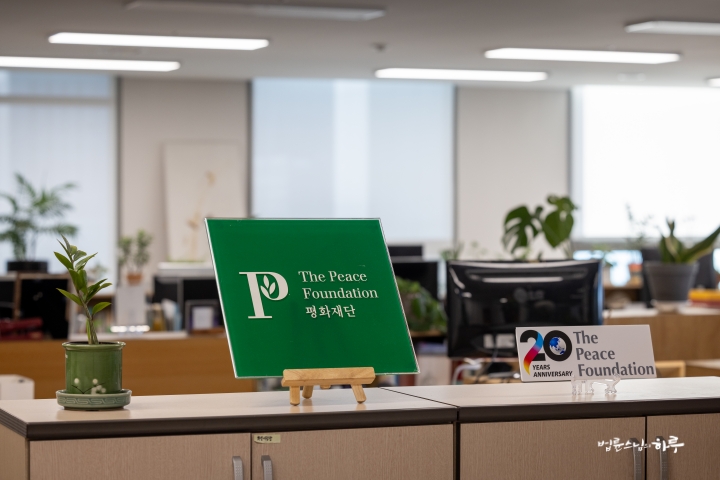
Sunim departed from Dubuk Retreat Center at 3 AM and headed to Seoul. He arrived at the Seoul Jungto Center at 6:30 AM, before sunrise.
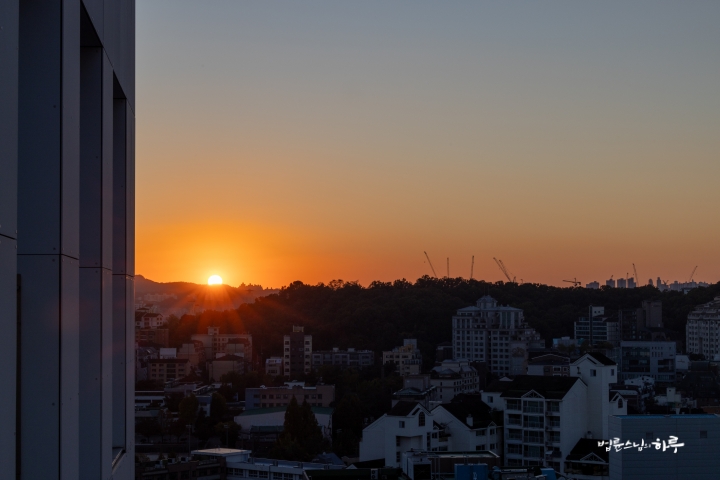
After breakfast and proofreading manuscripts, he attended to some work before heading to the Jungto Social and Cultural Center for the meeting. Moo, the Secretary General of INEB, and Anchalee, an executive committee member, were waiting for Sunim in the reception room.
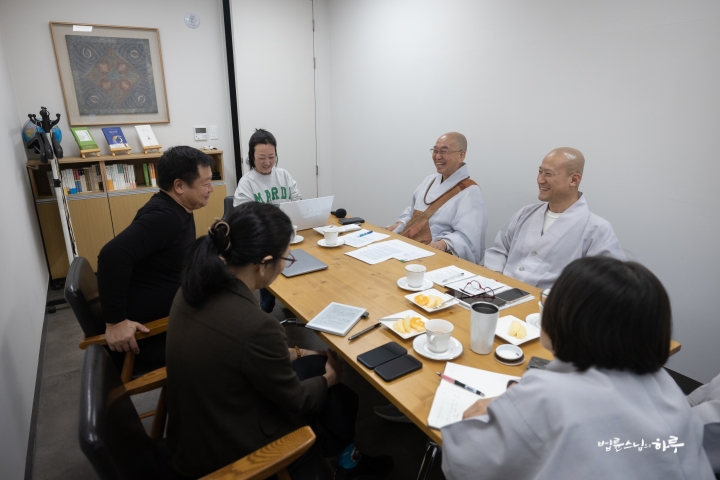
“Thank you for coming all the way from Bangkok to Seoul. I’ve cleared my entire day for our meeting as requested. We have plenty of time, so please feel free to discuss anything you’d like.”
After exchanging warm greetings, Moo began by sharing his proposal with Sunim.
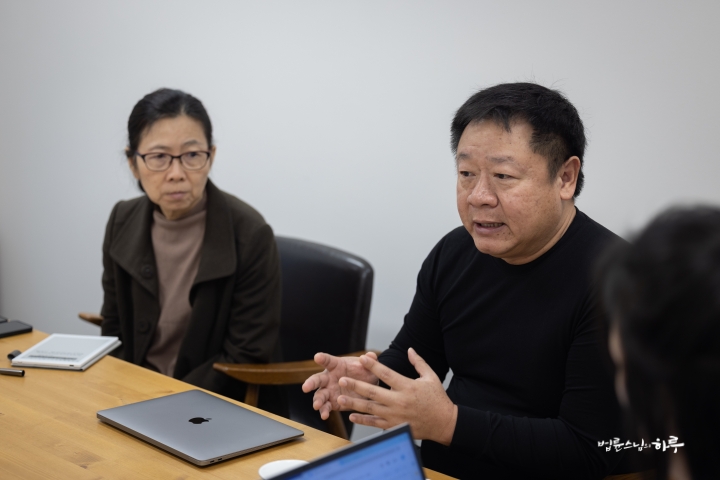
“Thank you for conducting two Jungto study tour programs, one for monks and another for female activists. We’d like to propose a third program for youth, which is why we’re here today.”
Anchalee also added her suggestions.
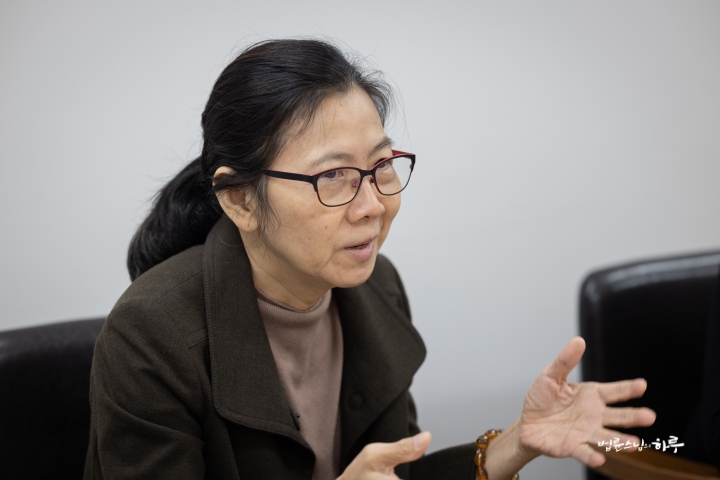
“We’d like to enhance the existing Jungto study tour program. We want to learn about the model of interfaith cooperation at The Peace Foundation and study JTS’s model of humanitarian aid and sustainable development in various countries.”
After listening to their proposals, Sunim shared his thoughts.
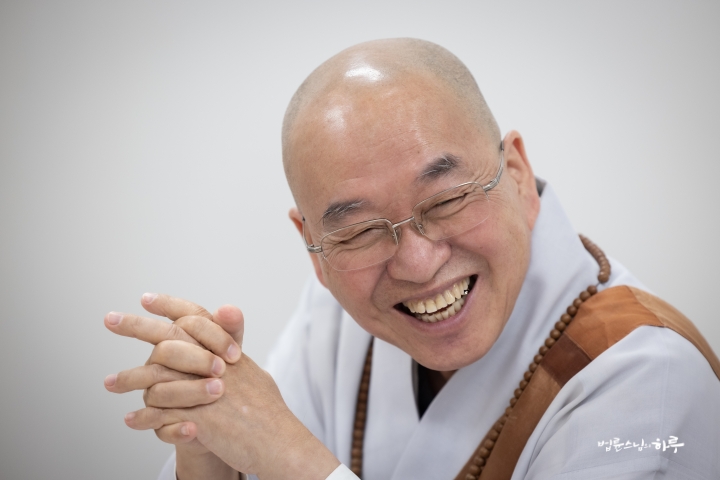
“If you want to educate and train Southeast Asian youth, I suggest conducting the program in Bodhgaya, India. JTS can provide the venue at Sujata Academy, where participants can engage in village development volunteer work and seminars, combined with pilgrimages to Bodhgaya and Rajgir. This way, the youth can learn a great deal. Many young people in Southeast Asia dream of visiting Bodhgaya.”
Moo then shared his perspective.
“The youth INEB program I’m envisioning aims to provide experiences of applying Buddha Dharma in modern society, which seems somewhat different from a pilgrimage.”
Sunim emphasized the importance of deeply understanding Buddha’s life to apply Buddha Dharma in modern society.
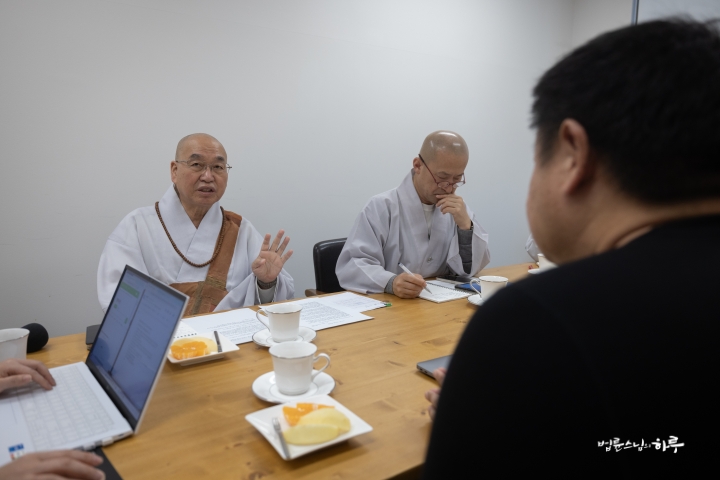
“To address various issues in modern society, activities must be based on Buddha Dharma to be sustainable. Buddha Dharma isn’t just about Buddhist doctrine. Studying on-site where Buddha actually lived makes the experience much more vivid. Seeing how children grow up in untouchable villages and how JTS develops villages with residents will greatly inspire the youth. Particularly, Sujata Academy has a system where senior students teach juniors. This method of receiving help and giving help to others is cost-effective and applicable in any poor country. While Jungto Society would like to run such youth programs, we lack the manpower. If INEB wants to run the program, we can certainly provide the venue.”
Why Social Action Should Be Based on Buddha Dharma
While Jungto Society engages in various social action activities, the foundation is a deep understanding of Buddha Dharma. Social action emerges when we understand various social issues based on Buddha Dharma. For example, even if someone likes Jungto Society’s volunteer-based operation and wants to apply it, it’s not easy to succeed. Jungto Society can operate on a volunteer basis because all members have deeply understood Buddha Dharma and resolved their own anguish. Simply adopting a volunteer-based approach doesn’t guarantee its success.
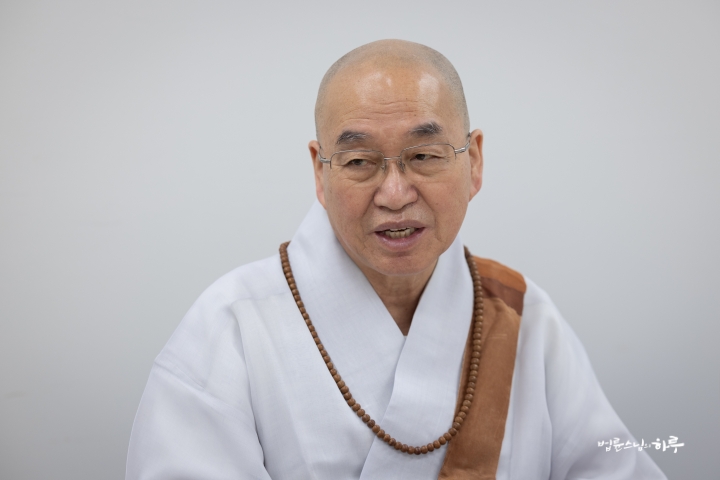
In Korea during the 1980s, there were many socially engaged groups under the Minjung Buddhist movement. However, most of their social engagement was based on social science rather than Buddha Dharma. Thirty years later, most have disappeared, with only a few remaining. Jungto Society has been able to sustain itself because it’s based on Buddha Dharma. Those who studied Buddha Dharma could engage in social action longer than those who studied social science. Buddha Dharma is based on practice, so personal change and social change align to some extent. That’s why I believe the INEB study tour program should focus more on deeply understanding and experiencing Buddha Dharma.
In that sense, next year, we could invite only those who participated in previous INEB study tours and are still actively engaged. Instead of touring various places, we could set a few topics for in-depth discussions on Buddha Dharma, and if necessary, visit relevant sites. This could be a good way to structure the program.
“Good idea!”
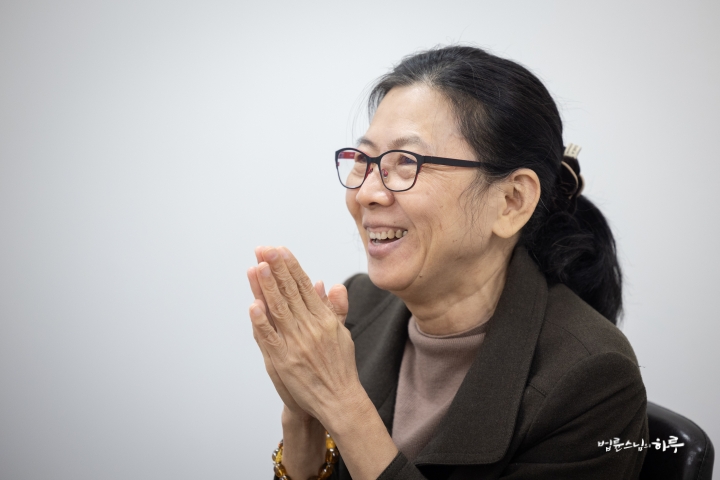
Starting with the issue of creating a new youth INEB program, the discussion gradually broadened. Sunim introduced other Buddhist organizations that could serve as models for engaged Buddhism, as well as Christian organizations that could be models.

They then discussed specific improvements for programs inviting leadership groups from Laos and Vietnam, programs for bhikkhunis, and programs for female activists.
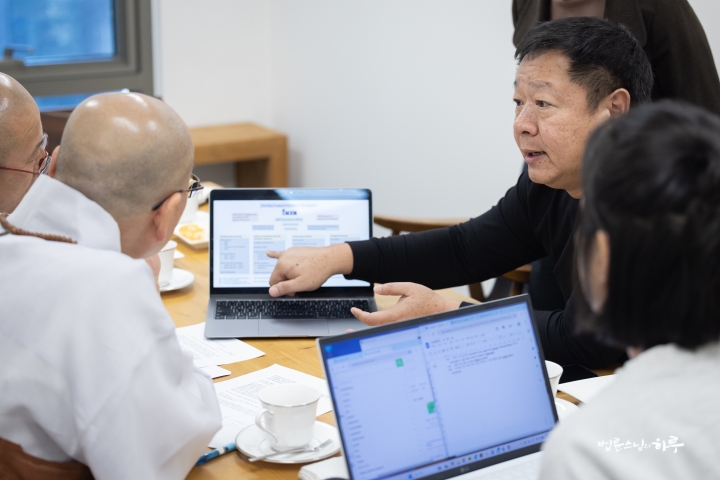
They discussed who to invite as examples of interfaith harmony for the International Reconciliation Conference in July next year, how INEB should participate in future India pilgrimages, and various other topics before concluding the morning session.
After lunch, they resumed the meeting at 1 PM. In the afternoon, they evaluated the women’s INEB program conducted over the past week and then summarized the morning’s discussions one by one.
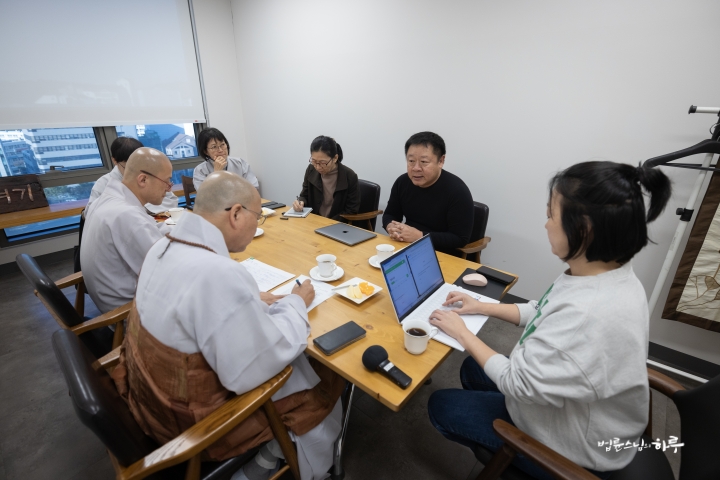
Finally, they decided to conduct the INEB program for monks annually, while alternating the youth INEB program and women’s INEB program every other year, and concluded the meeting.
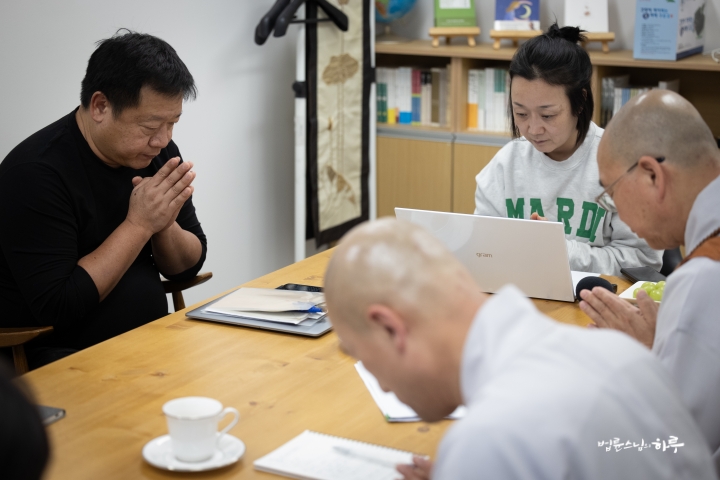
They took a commemorative photo with Moo and Anchalee from INEB and the International Cooperation Team before saying goodbye.
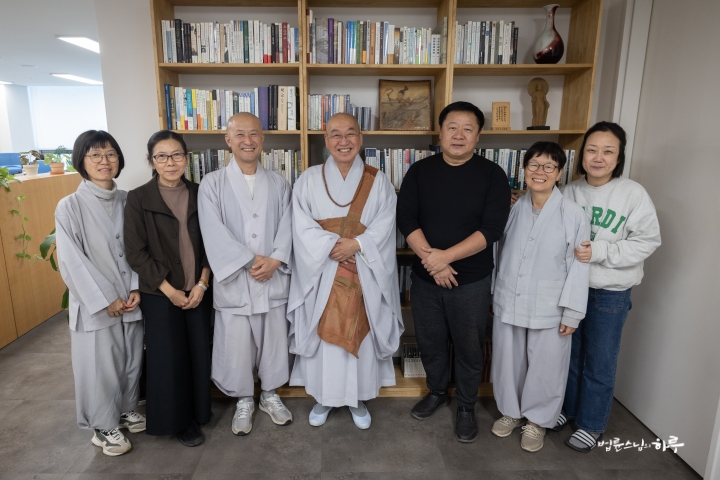
“Thank you for your hard work this week. Travel safely. As for supporting Myanmar refugees, we’ll continue to provide support as long as it aligns with JTS principles.”
“Thank you, Sunim.”
At 2 PM, Namal, who served as the volunteer representative during JTS’s emergency support in Sri Lanka, visited. They had met two weeks ago to discuss housing issues for homeless people in Sri Lanka and support for cancer patients’ medications. Today, they discussed establishing a local JTS corporation in Sri Lanka.
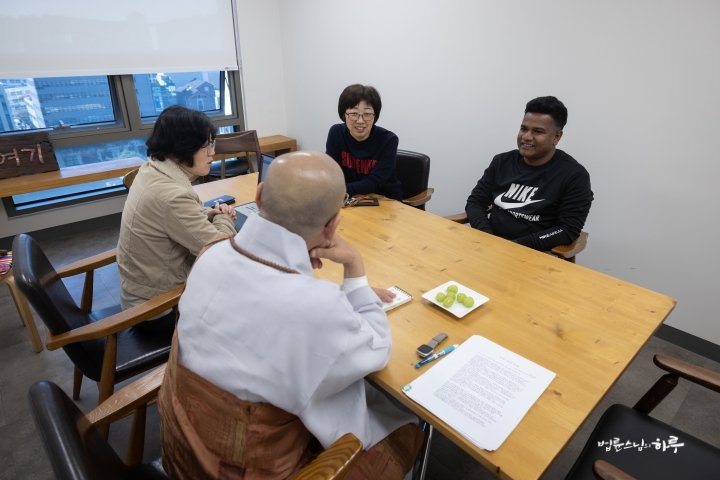
“We’ll support any efforts to help those in need in Sri Lanka, so please work hard on this.”
“Thank you. I’m also studying hard about the project you’re doing in Bhutan.”
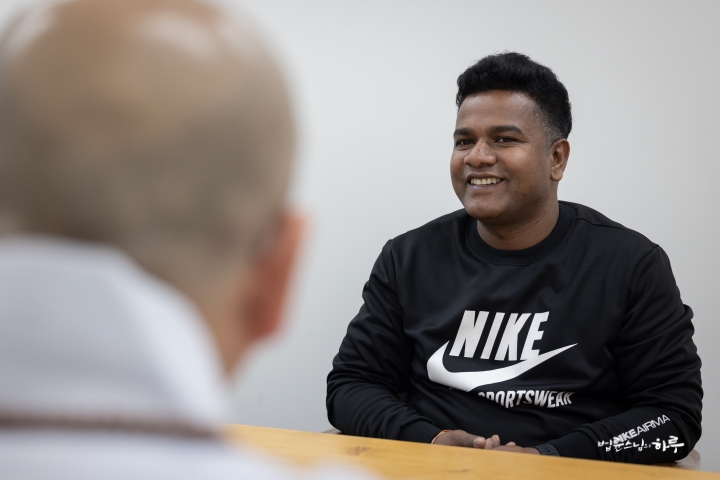
Namal agreed to research the process of establishing a JTS corporation in Sri Lanka, and Sunim encouraged him to continue his dedicated work.
At 3 PM, Sunim received a report from the Secretary General of The Peace Foundation about the upcoming 20th anniversary celebration at the Kim Koo Museum and Library on the 14th. He shared his opinions on what additional preparations should be made in the remaining week.
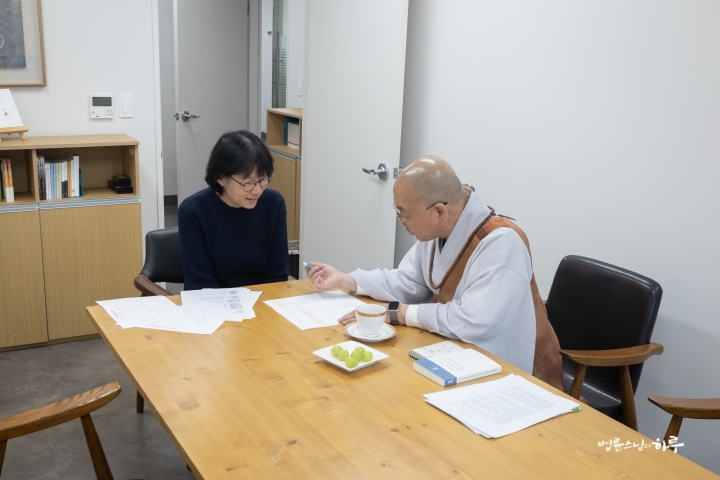
After a full day of meetings, Sunim left the Peace Foundation and returned to the Seoul Jungto Center.

As the sun set, at 7:30 PM, Sunim began the Friday Dharma Q&A live broadcast from the broadcasting room of the Jungto Center. With about 4,700 people connected to the live stream, Sunim gave his opening remarks.
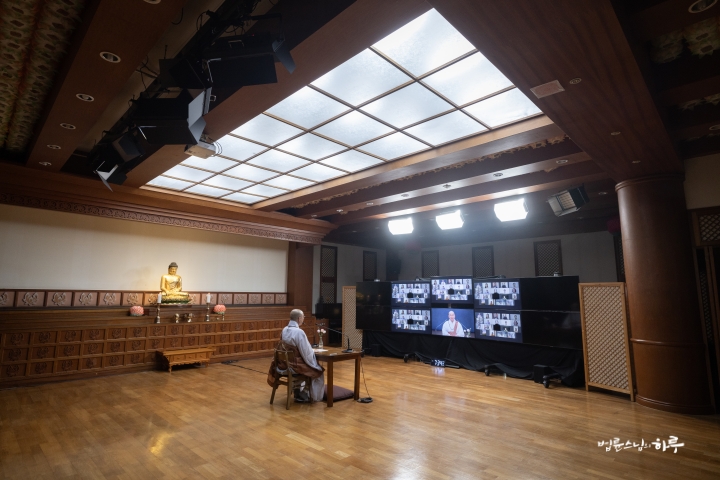
“The weather has gotten much colder. Yesterday morning, temperatures in some central regions dropped below freezing. It’s said that the weather will warm up starting this afternoon. This summer was extremely hot. Even autumn wasn’t typical, with the heat continuing until Chuseok. As a result, vegetable and fruit crops didn’t fare well, causing their prices to skyrocket. Talking with villagers, I learned that while climate change is a factor in the high prices of vegetables and fruits, the shortage of farm workers in rural areas has also had a significant impact. Farmers, now aging, mostly have to hire foreign workers to cultivate their land. When farmers work their own land, they don’t calculate their labor costs separately. However, when hiring foreign workers, they have to pay daily wages, which is reflected in the vegetable prices, causing an overall price increase. I think we might continue to face expensive vegetables and fruits not just this year, but in the future as well.
I visited Bhutan the week before last. While there, I checked on the autumn harvest situation and examined the progress of water supply projects addressing village water issues. In this region, water is scarce, so pipes were connected from distant water sources to supply water. Given the urgency of the water situation, some villages completed construction within a month of starting. Let’s watch a short video about this and then discuss it together.”
Next, we watched a video of Sunim’s visit to Bhutan last week.
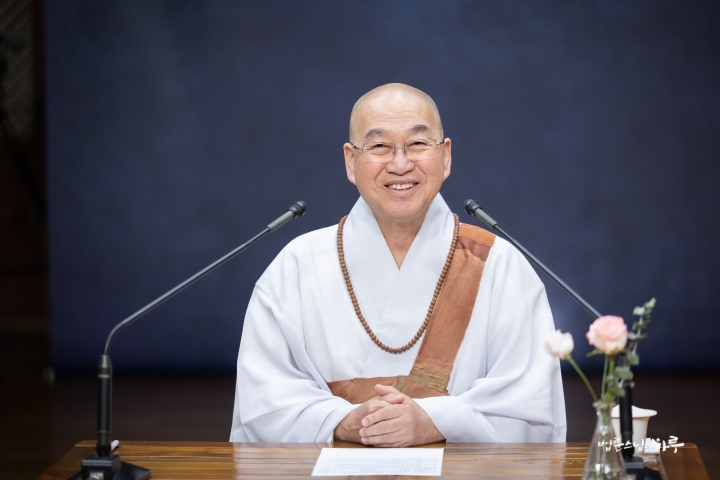
“Our small acts of sincerity and support can bring great joy and hope to those people. On the opposite side of the globe, there are various difficulties such as lack of water and food, or children unable to attend school. Our country also experienced such hardships in the past. If you’re now comfortable with your food, clothing, and shelter, I hope you’ll remember those times and consider donating a portion of your living expenses to support these people, providing them with water, food, and medicine.”
Following this, four people who had submitted questions in advance engaged in a dialogue with Sunim. One of them sought Sunim’s advice on how to break the habit of drinking alcohol every night before bed.

I Want to Break the Habit of Drinking Alcohol Every Evening
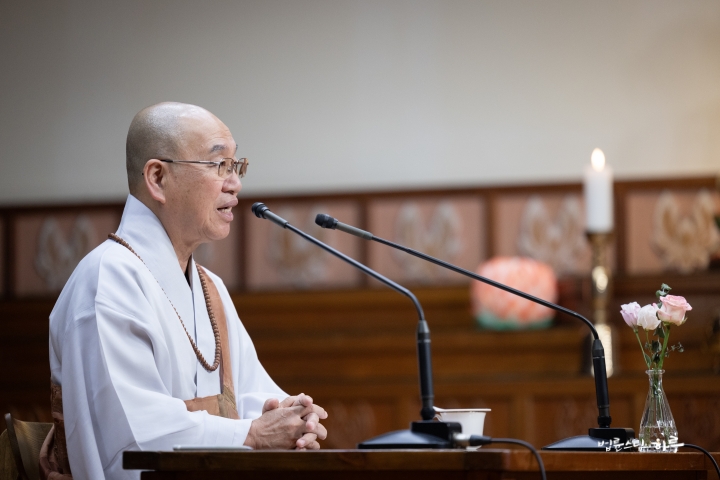
“When we talk about alcohol addiction, there are mainly two types. One is habitual, which applies to the questioner’s case. It’s about not being able to break the habit of drinking. It’s similar to smokers who can’t quit smoking.
The other type is addiction, where someone doesn’t necessarily become violent when drinking, but continues to drink without eating. They can’t stop the act of drinking. It’s not just having a drink in the evening, but drinking continuously day and night. When someone is addicted to alcohol like this, it becomes difficult to maintain a normal daily life. The method to stop this continuous drinking is to be hospitalized and forcibly stop drinking. Whether it’s for a week or ten days, being hospitalized prevents drinking, and when not drinking, the mind becomes clear. However, when stress occurs, they might start drinking again. Once they take a sip, they can’t stop and continue drinking. If they keep drinking without eating, their body deteriorates. Then they end up in the hospital again. After being discharged, they return to a normal state. Such individuals should not touch alcohol at all because once they do, they can’t stop. This is alcoholism as a disease, similar to drug addiction.
On the other hand, smoking is more of a habit than an addiction. Although habits are hard to break, they don’t make daily life impossible. However, these individuals can’t stop their habit even if it harms others. They might secretly smoke in airplane bathrooms despite prohibitions and pay fines, or smoke on rooftops or balconies in buildings where smoking is not allowed. Even if their lungs deteriorate from smoking, they can’t quit because it has become a habit. With alcohol, when it becomes habitual, one needs to drink every evening to fall asleep. They need to be slightly intoxicated to sleep well.
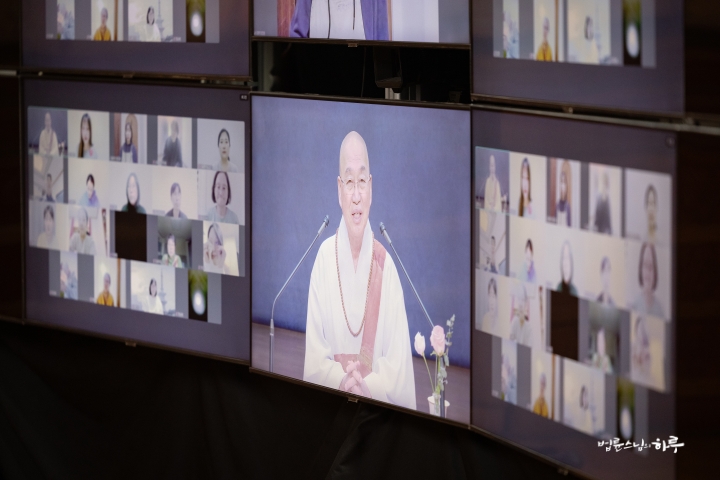
The questioner’s condition is not yet alcoholism, but rather a habitual state. Drinking alone increases the likelihood of developing a habit compared to drinking with friends. Even if you drink heavily with others at social gatherings to the point of being carried home, once you sober up the next day, it’s over. You may feel unwell for a day, but you’ll be fine the next day and then not drink for a few days. In such cases, even if there are some alcohol-related issues, it’s not yet a habit. The nature of drinking heavily and having a habit are somewhat different. Someone who drinks a lot, then abstains for a few days, then drinks a lot again can be considered someone who enjoys alcohol. However, people with a habit like the questioner tend to drink alone. Drinking alone daily increases the chances of, first, developing a habit, and second, eventually becoming an alcoholic. You’re still young, so it’s just a habit for now, but as time passes, you may find yourself unable to quit. You’ll become unable to stop drinking, which will lead to various symptoms and problems.
When an adult over sixty drinks a cup of makgeolli or soju in the evening to help them sleep, it’s not considered a habit because it aids blood circulation. That’s why elders have traditionally referred to drinking alcohol medicinally as “yakju” (medicinal alcohol). Of course, yakju is still alcohol, but that level of consumption doesn’t lead to habit formation. Similarly, when farmers drink a cup of makgeolli after work, it doesn’t become a habit or addiction. It’s a way of replenishing energy. Alcohol quickly generates heat when consumed, doesn’t it? While regular food takes hours to be absorbed as it passes through the intestines, alcohol is absorbed directly in the stomach. This means it can be used as energy within 30 minutes. That’s why workers can regain strength to continue working after having a drink when they’re tired. Alcohol acts as a short-term energy source, so it can’t be considered entirely bad.
If you drink so much that you lose consciousness or cause trouble for others due to your behavior while drunk, you should definitely quit drinking. However, if you’re like the questioner who drinks daily and can’t bear not drinking, even without causing problems, it can be considered a habit. If this habit becomes excessive, it can develop into alcoholism. Once you become an alcoholic, it’s difficult to overcome on your own and you’ll need to seek treatment at a hospital. However, the chances of fully recovering from alcoholism are very low. People often repeat cycles of hospitalization and discharge, ultimately leading to an early death. But it seems you live alone now. Are you married?”
“Yes, I’m married.”
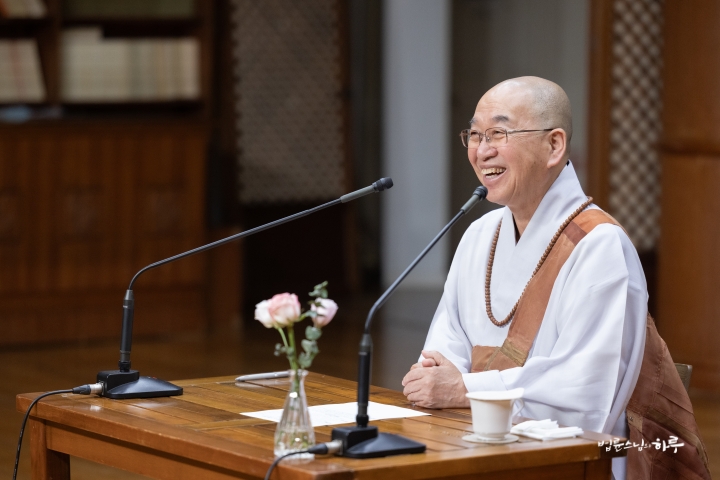
“You’re married, so why are you bored in the evenings? Where is your husband? Or do you drink together with your husband?”
“No, my husband doesn’t drink. I drink alone.”
“Don’t you talk with your husband?”
“My relationship with my husband is good. In fact, when I drink, I can have more fun with him and we talk more.”
“Even if you drink every evening, having just one or two drinks would be fine, but drinking to the point of intoxication seems likely to seriously damage your health in the future.”
“I think so too. If I continue living like this, my health might suddenly deteriorate someday. But I can’t quit drinking. I’ve tried psychological therapy multiple times, hypnotherapy, and even taken medication from the hospital, but nothing works.”
“Have you tried medication that makes you vomit or causes physical discomfort when you drink alcohol?”
“Is there such medication?”
“Yes, if you take that medication and then drink alcohol, it causes vomiting or very unpleasant physical reactions. This is supposed to make you avoid alcohol because you dislike those symptoms.”
“But I think if I took that medication, I would just say ‘This is because of the medication!’ and drink anyway.”
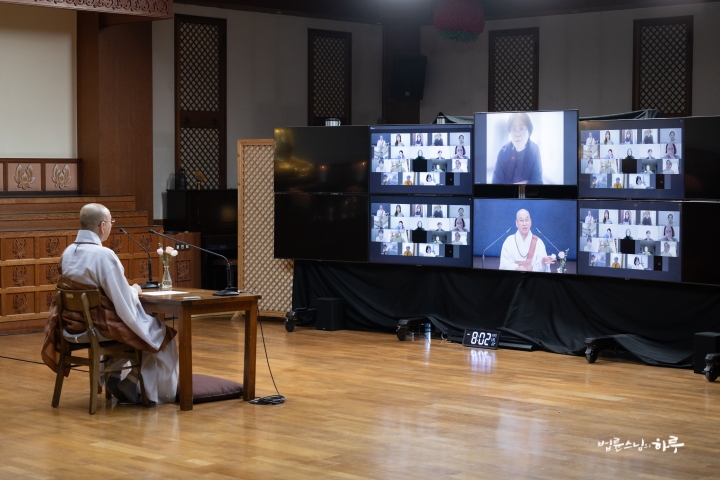
“Have you heard of Sotae? It’s a medicine that was used in the past to wean babies off breastfeeding. It has a very bitter taste, and when babies wouldn’t stop breastfeeding, it was applied to the nipple to help wean them. Similarly, for people habituated to alcohol, taking this medicine is said to cause a strong aversion to alcohol. It affects the subconscious, making you not want to drink. I haven’t tried or experimented with it myself, but this method exists.
You’re fine now, but if you continue drinking, there’s a possibility you could become an alcoholic. So you would better stop drinking for a while. If that’s difficult to do at home, participating in a training program called ‘The Awakening Retreat’ at the Mungyeong Jungto Retreat Center could be helpful. Because you’re in a confined space for 5 days during the retreat, you can’t drink alcohol during that time. Many people who couldn’t quit smoking were able to do so after participating in the Awakening Retreat. It’s an environment conducive to quitting smoking, but also because the retreat helps relieve mental stress, it can provide an opportunity to stop smoking. If you really want to quit drinking, I suggest you try participating in such a retreat.”
“I once quit for about two weeks when I was on a diet.”
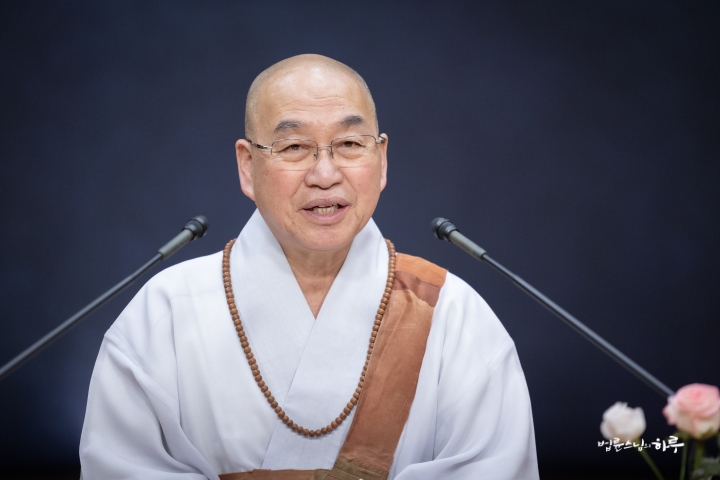
“Stopping alcohol by participating in such a retreat is different in nature from just enduring through willpower. Usually, forcibly enduring is like a spring that’s been pressed down – when released, it springs back up. If you just endure, you’ll eventually return to your original state. For example, if a smoker goes to prison and can’t smoke for about 2 years, they can live without much discomfort while in prison. But as soon as they’re released, they’ll seek out a tobacco shop first thing. So, suppression leads to a return to the original state.
However, if you participate in the Awakening Retreat, you can eliminate habits ingrained in your mind. For example, when you’re very angry at someone, even if you think ‘Okay, I understand. I’ll forgive you,’ you might still wake up suddenly thinking ‘How could you do this to me!’ In the Awakening Retreat, when you deeply observe and resolve the causes of mental suffering like hatred, resentment, or hurt feelings, habits like drinking and smoking can naturally be broken along with it.
It would be good for you to quit drinking for a while. You shouldn’t touch alcohol at all for at least a few years. Even after that, if you do drink, it should only be like having a toast at a company dinner, not drinking regularly in daily life. You need to consistently practice not drinking alcohol. However, you shouldn’t force yourself to endure. If you do, you’ll get stressed and end up drinking again when something triggers it.”
“The reason I drink every day is that drinking is the only fun thing in my life. Everything in my daily life is boring and dull except for drinking and having fun.”
“After attending the Awakening Retreat, you’ll find that there are many interesting things in life even without alcohol, cigarettes, marriage, or gambling. You don’t seem to cause trouble when you drink, and you don’t have difficulties in your daily life, so it doesn’t seem to be a serious concern yet. However, you should be able to stop this habit on your own at any time. Try stopping drinking for a month, then drink a little, then stop again, you need to become free from alcohol like this. If you can’t do this, it’s evidence that you’ve become a slave to alcohol. Although you don’t have major side effects from drinking yet, it would be good to be cautious for your future. First of all, attend the Awakening Retreat as soon as possible. You should quit drinking after attending the Awakening Retreat first. Otherwise, you won’t be able to keep your own promises. After doing the Awakening Retreat, it becomes very easy to quit drinking.”
“I understand. While talking with you today, I thought, ‘Did I develop this habit because I first drank secretly with friends?’ I will definitely attend the Awakening Retreat.”
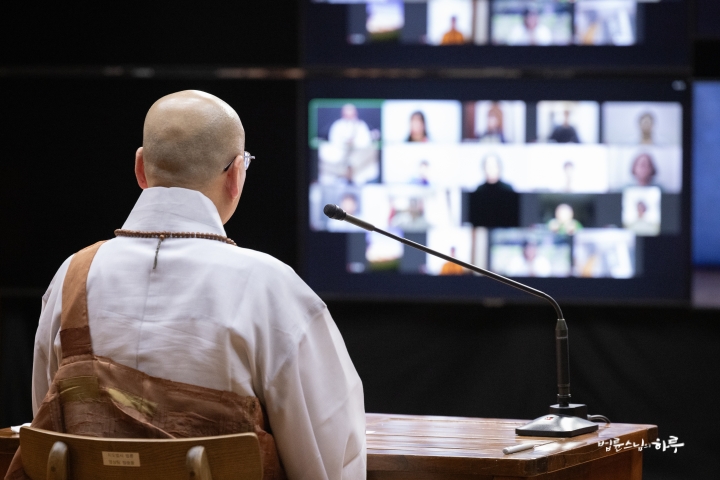
“Alcohol is just a type of food, so there’s no need to view it negatively. However, alcohol has its own unique properties. First, alcohol slightly excites or intoxicates people. So when you drink, it becomes harder to control yourself – you might suddenly get angry, or find the courage to confess to someone you like. When intoxicated, your mind becomes slightly elated. This elation can lead to morally wrong actions, but it can also enable you to do good things that were difficult before. The reason alcohol is prohibited for practitioners is that this mental elation is not conducive to practice. Practice is about calming the mind. You need to be aware of these properties of alcohol. Otherwise, you’re likely to make mistakes when drinking. The feeling that you can drive better when drunk is also due to this mental excitement. That’s why there’s a high risk of accidents. Most crimes like sexual harassment also occur when people are drunk, rarely otherwise. When drunk, your moral sense weakens slightly, and you feel like you can do anything. You need to be aware of these properties of alcohol.
Secondly, alcohol can become habit-forming. Cigarettes don’t excite people like alcohol does, but they become a habit. Drugs might excite you a bit and become habit-forming. Each substance has its own properties. Historically, there have been periods when alcohol was prohibited, and some religions prohibit alcohol. This is all due to these properties of alcohol. Alcohol has many side effects when consumed frequently or in large amounts. Alcohol is usually served at social gatherings because it slightly excites people. When intoxicated, people tend to sing, and even those who couldn’t dance before might dance in front of others. On the flip side, negative effects can also occur. Couples might fight, or people might make mistakes in front of others.
So, alcohol has elements that excite the human mind and can become habit-forming. Your feeling that things are only fun when drinking is due to the mind-exciting property of alcohol. Drinking every day indicates habituation. You haven’t experienced major side effects from drinking yet, so you view alcohol as a life lubricant, but if you continue drinking, more and more side effects will occur.
The problem is that you’ve become so habituated to alcohol that you can’t stop on your own. To break this habit, you need some strong shock or trigger. Willpower alone isn’t enough to quit drinking. A retreat like the Awakening Retreat can give a strong shock to your subconscious. This can help in quitting alcohol. Many people who really loved alcohol have quit after doing the Awakening Retreat. I hope you’ll give it a try.”
“Thank you.”
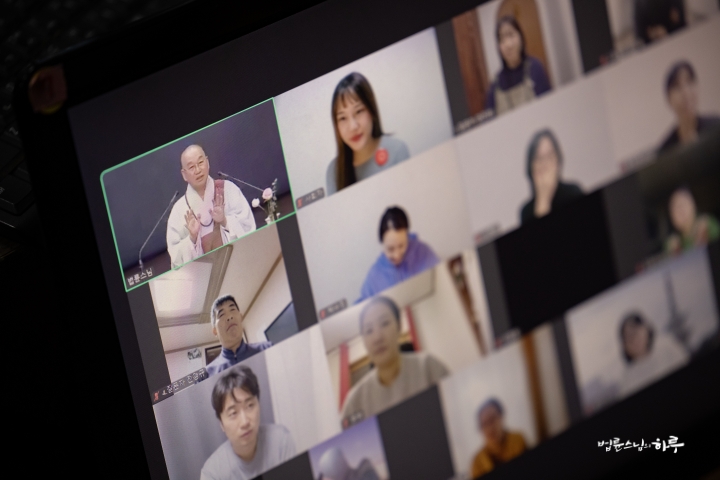
The questions continued.
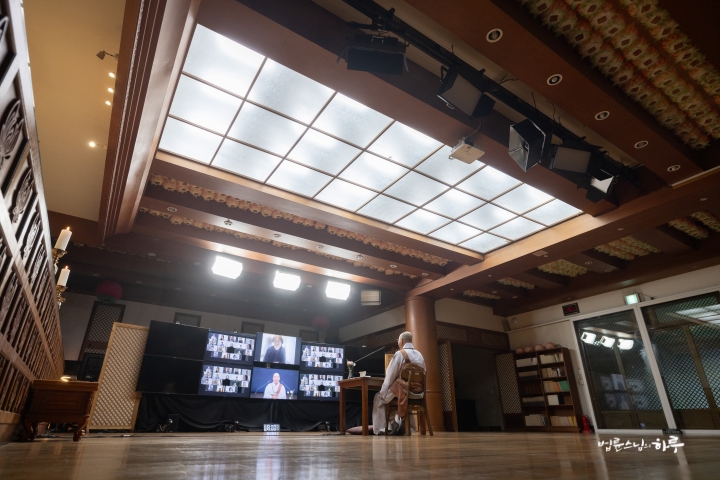
I’ve been running a cat hotel for 7 years. Two months ago, I opened a new place investing nearly 100 million won, but it keeps getting damaged here and there, causing me stress. How should I manage my mind?
I work at my father’s company, and he wants me to empathize with him during work conversations. I ignored him because I dislike his inability to separate personal and professional matters, but now he feels hurt. What should I do?
I have to continue giving education and lectures at my company, but I get nervous every time. I’m curious about how to give lectures well without getting nervous.
By the time the conversation ended, it was well past 9 PM.
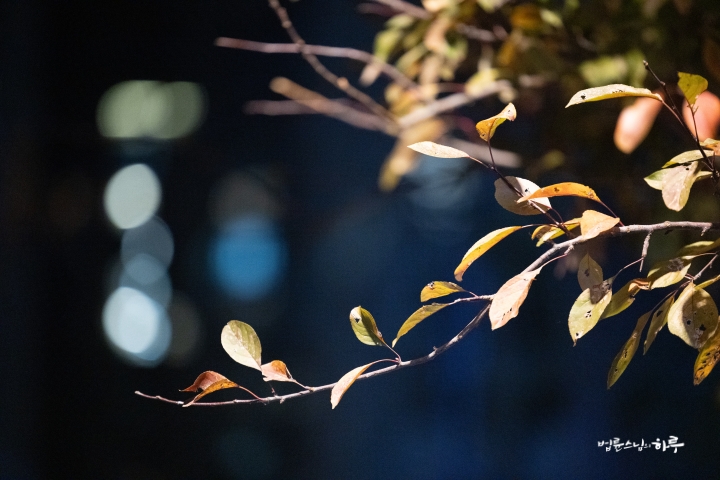
Tomorrow, there will be a live Dharma Q&A broadcast for the Jungto Dharma School students who enrolled last September.




